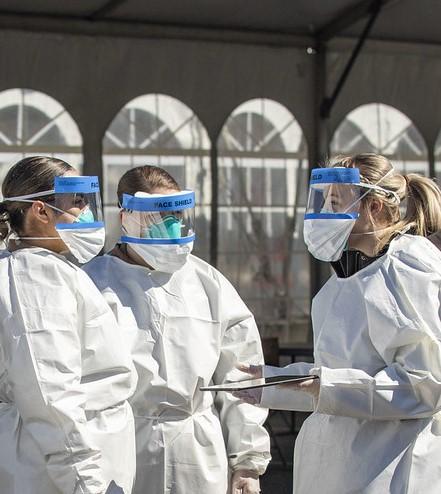After 2 days of stable COVID-19 death counts, New York state today recorded 731 deaths from the novel coronavirus, the highest daily death toll noted in the hardest-hit US state. In total, the state has seen 138,836 cases and 5,589 deaths.
In related US news, African-Americans appear to be disproportionally affected by the pandemic, and a new poll reflects a high rate of concern and lifestyle changes among the public.
Mixed picture in New York
Today during a somber press conference, Governor Andrew Cuomo said there were still some signs the virus was plateauing in New York, including a leveling off of hospitalizations in recent days. But Cuomo emphasized that without widespread testing, reopening New York state will be a challenge.
"It's all about testing, testing, testing," said Cuomo. "We have done more testing than any state in the nation, but we need to do even more."
Across the state, morgues are filling up as fast as hospital beds. Today the Cathedral Church of St. John the Divine in Manhattan announced it will turn part of the church into a 200-bed field hospital. In an interview with the New York Times, Rt. Rev. Clifton Daniel III, the dean of the cathedral, said putting the church to this use had historical precedent.
"In earlier centuries, cathedrals were always used this way, like during the plague. So this is not outside the experience of being a cathedral, it is just new to us," he said. Field hospitals have also been erected in Central Park and the Javits Convention Center. NYC Health said New York City alone has seen 68,776 COVID-19 cases, requiring 15,333 hospitalizations.
Neighboring New Jersey also reported its greatest daily increase in deaths—229 fatalities. Governor Phil Murphy announced today he was extending social distancing measures in that state for another 30 days.
"Everybody watching: Stay at home," Murphy said during a press conference. "I hate to break people's bubbles, but we're just not close." Murphy said today the state has 44,416 total cases and at least 1,232 deaths.
Murphy also Tweeted earlier today that California Governor Gavin Newsom was sending New Jersey 100 ventilators. Murphy also announced today he was closing all state parks and county parks in an effort to increase social distancing.
Today the United States has reported a total of 386,800 cases, and 12,285 deaths, according to a tracker maintained by USA Today.
Higher death rates in African-Americans
Today newspapers across the country detailed how African-Americans in Chicago, Milwaukee, Detroit, and New Orleans were experiencing higher rates of COVID-19–related deaths and severe disease.
According to the Louisiana Department of Health, black citizens make up 70% of the reported 16,284 patients. The Chicago Tribune reports that black Illinois residents are dying from COVID-19 at a rate of six times their white counterparts.
In Milwaukee County, 73% of recorded deaths have been in African-American residents. According to the Washington Post, black people make up half of Wisconsin's COVID-19 patienets but represent only 6% of the state's population.
In Michigan, which has seen Detroit turn into a hot spot, state officials recorded 118 deaths and 1,749 cases in the past 24 hours, raising state totals to 18,970 cases and 845 deaths. According to the Detroit Free Press, the largest hospital system in the state, Beamount, said 1,500 employees had the disease, including 500 nurses.
Survey shows 64% of public very concerned
Today JAMA Internal Medicine published a survey study of Americans on COVID-19. A total of 63.8% said they were very or extremely concerned about the pandemic, and 95.7% said they had made lifestyle changes because of the novel virus.
A total of 8,950 respondents replied to the survey posted on Twitter, Facebook, and Nextdoor.
While many Americans reported lifestyle changes, including increased hand washing (93.1%), avoiding social gatherings (89.0%), and stockpiling food and supplies (74.7%). Only 19.2% of respondent said they were self-isolating all of the time, while 49.8% said they were self-isolating most of the time and leaving the house only to buy food and essentials.





















